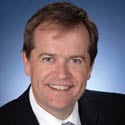
He said that his regulatory reforms to the superannuation industry were the result of “robust negotiations and compromise”, a process that he conceded could sometimes lead to complexity.
“The story of Australia is one of pragmatism, not ideology. Where there’s compulsory savings … the stewards of the money have an obligation to force down fees and charges and work towards better performance,” he said.
However, he added that various sectors of the superannuation industry had been “worrying about perceived advantages in terms of distribution that another sector might have” rather than focusing on the overall goal of reforming the system.
In particular, he was disappointed by the constant “sniping” between industry super funds and retail funds. He added that there was general support for the Future of Financial Advice reforms, with the exception of “a few rogue planners”.
But there was a general consensus that if the superannuation guarantee (SG) was to be increased to 12 per cent, the efficiency and equity of the system would have to improve, Shorten said.
The increase to the SG would put Australia in the box seat globally when it came to retirement savings, he said.




